 |
Introduction |
| |
| |
Adhesive bonds 의 접착력인 bonding strength 를 측정하기 위해서는 Tensile Strength 측정장비를 주로 사용하는데 이는 한번에 한 개의 sample 만
측정할 수 있으며, special clamping 도구가 필요하고, 힘을 양쪽 방향으로 일직선으로 유지되게 하여주는 alignment 장치가 필요하다.
Coatings 와 Multilayered 물질의 접착력 측정에 주로 사용되는 Peel Test 방법의 경우 semi-quantitative and qualitative evaluation 만이 가능하다.
Analytical centrifugation 을 이용하는 완전히 새로운 분석장비인 LUMiFrac Adhesion Analyser 는 centrifugal force 를 이용하여 최대 8개의 sample 의
bonding & adhesive strength 를 편리하게 측정할 수 있다. |
| |
 |
State-of-the-art testing procedures |
| |
| |
현재 adhesive or bonding strength 를 측정하기 위해서는 양쪽 면을 반대로 당기는 Pull Test 방법 (Fig. 1) 과 coated surface 를 scratching 하는
Cross-cut Test, substrate 를 coating 을 떼어내는 Peel Test (Fig. 2) 와 같은 방법이 있다. |
| |
| |
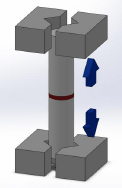 |
Fig. 1 : Tensile Testing after [6] according to DIN EN 15870 |
| |
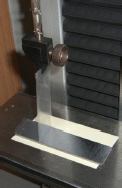 |
Fig. 2: Test setup of a 90° peel test according to ISO 8510-1:1990 [4]EN 15870 |
|
| |
| |
Tensile Test 는 tensile strength 를 측정하는 유일한 방법이지만 coating 을 측정하지는 못하고
Clamp 를 이용하여 측정할 표본의 양쪽 끝을 잡아주어야 하고 shear force 를 방지하기 위해 양쪽 끝에 가해지는 strength 의 방향을 일직선으로 해주어야 한다.
또한 한번에 하나의 sample 만을 측정가능 하므로 다른 물질들간, 다른 접착제 사이의 adhesive strength 를 비교하기는 매우 어려운 과제가 된다. |
| |
 |
Principle of the centrifuge technology |
| |
| |
특수하게 디자인된 Module 에 substrate 와 adhesive material 을 넣고 centrifugation 시키게 되면 (Fig. 3) sample 에 원심력이 가해지는 이 centrifugal force 는 다음과 같다.
FC = m ω² r = m (2 π RPM/60)r
여기서 m 은 rotating test stamp 의 total mass, ω 는 rotational angular velocity, r 은 test stamp 의 radial distance 를 나타낸다. Glued Parts 와 Tensile stress 의 관계는
다음 공식에 의한다.
σ = F / A |
| |
| |
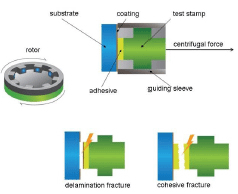 |
Fig. 3: Measurement principle using centrifuge technology. |
|
| |
| |
전형적인 테스트 방법에서 sample 은 substrate1 / adhesive / substrate2 로 구성되어 있는데 centrifuge technology 방법에서는 위 그림과 같이 sample assembly 를
형성하여 테스트 하게 된다. 즉 Test Stamp 가 substrate1 의 기능을 하고 substrate2 의 기능을 하는 substrate 는 cylindrical guiding sleeve 에 의해 고정되어
sample assembly 를 만들고 이 assembly 가 Failure Detection Module (FDM) 안에 설치되어진다 (Fig. 3.1). |
| |
| |
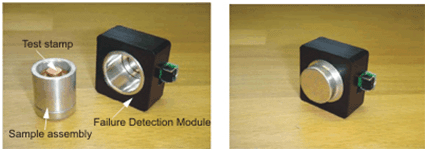 |
| Fig. 3_1: Sample Assembly and Failure Detection Module (FDM) |
|
| |
| |
Sample assembly 가 설치된 FDM module 은 Rotor 내부의 정해진 detection position 에 위치되는데 이 원리에 의해 별도의 clamping 과정 없이
정확한 alignment 에 의한 테스트가 가능해진다. Centrifugation 시켜 원심력을 주게 되면 adhesive material 이 bonding 되어있는 test stamp 가 원심력을 받아
어느 한 순간에 접착물질로부터 떨어지게 되는데 이 순간의 strength 를 분석장비인 LUMiFrac Adhesion Analyser 이 자동으로 측정하게 된다.
LUMiFrac Adhesion Analyser 의 분석 프로그램인 SEPView 는 test stamp 가 떨어지게 되는 순간의 RPM, 그리고 test stamp 의 종류 등을 계산하여
순간적으로 monitor 에 다음과 같은 그래프를 나타나게 된다. (Fig. 4.a) |
| |
| |
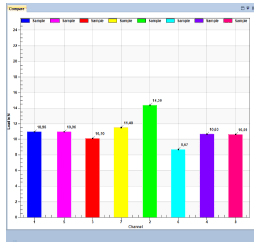 |
| Fig.4 a: Breaking load , loading- and RPM-progression over time and summary table (right) in SEPView |
| |
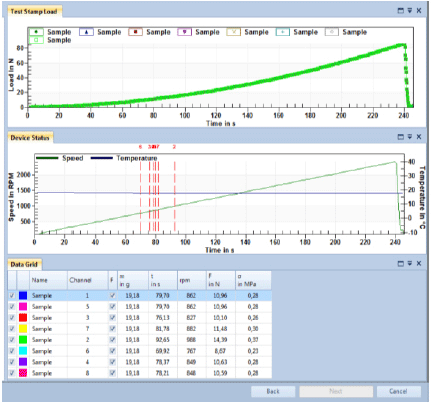 |
| Fig.4 b: Breaking load , loading- and RPM-progression over time and summary table in SEPView |
|
| |
| |
LUMiFrac 은 같은 종류의 sample 의 접착력을 분석하기도 하지만 각기 다른 종류의 substrate, adhesive, coatings 의 접착력을 비교분석 할 수 있다.
또한 측정 조건이 항상 일정하게 유지되기 때문에 결과의 재현성이 매우 뛰어나다. (Fig. 5) |
| |
| |
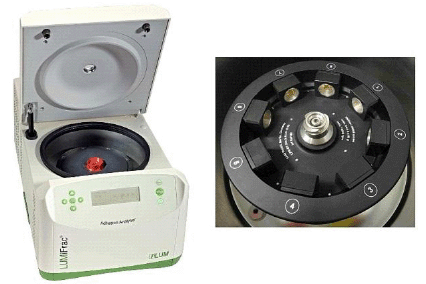 |
| Fig. 5: Adhesion Analyser LUMiFrac® (left) and rotor carrying the 8 failure detection modules for the test assemblies (right) |
|
| |
 |
Application examples and results |
| |
| |
Fig. 6 은 2-C-Epoxy 수지의 mixing ratio 와 양생온도가 copper 와 construction steel S235 를 접착시키는 2-C-Epoxy 수지의 접착력에 어느 정도
영향을 주는가를 LUMiFrac Adhesion Analyser 를 이용해 측정한 결과이다. |
| |
| |
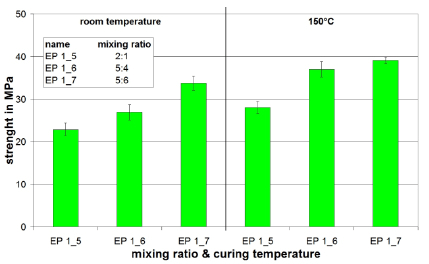 |
| Fig. 6: Results of testing the strength of bonded joints between copper and construction steel.
3 different mixing ratios of a 2-C-Epoxy adhesive cured at room temperature and 150°C. |
|
| |
| |
위 결과에서 우리는 mixing ratio 를 달리할수록, 그리고 더 높은 온도에서 양생할수록 에폭시 수지의 adhesive strength 는 증가하는 것을 알 수 있다.
LUMiFrac Adhesion Analyser 는 각기 다른 접착제가 각기 다른 물질에 대해 어느 정도 adhesive strength 를 보여주는지 동시에 비교 측정할 수도 있다.
4 종류의 물질 [Alumina, (Al), Copper (Cu), Stainless steel (V2A) and Polyvinyl Cloride (PVC)] 과 copper 사이를 접착시키는데 있어 3종류의 접착제,
Cyanoacrylate (CY), Epoxy (EP), Polyurethane (PU), 사이의 접착력을 비교 분석한 결과를 Fig. 7. 에 나타내었다. |
| |
| |
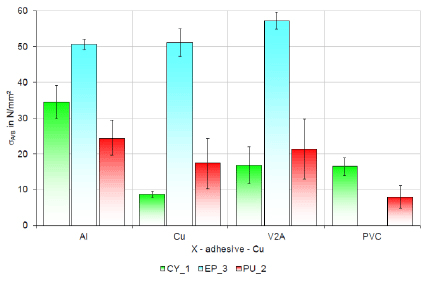 |
| Fig. 7: Comparison of different adhesives (Cyanoacrylate (CY), Epoxy (EP), Polyurethane (PU) denoted by different colours) and materials (Alumina, (Al), Copper (Cu), Stainless steel (V2A) and Polyvinyl Cloride (PVC)) bonded to copper. As the curing temperature of EP was 180°C, Cu/EP/PVC joint could not be prepared. |
|
| |
| |
위 그래프에서 보듯이 Epoxy 가 접착하고자 하는 물질의 종류와 상관없이 50 N/mm² (50 MPa) 의 tensile strength 를 보이고 있다는 것을 알 수 있는 반면 CY 와 PU 는
tensile strength 가 낮고 또한 접착시키고자 하는 물질의 종류에 따라 strength 가 달라진다는 것을 알 수 있다.
LUMiFrac Adhesion Analyser 는 접착제의 adhesive strength 를 측정하는 것 외에 sbustrate 에 coating 되어 있는 물질의 coating strength 를 측정할 수 있다.
Coating strength 를 측정하기 위해서는 test stamp 와 접착되어 있는 접착제의 adhesive strength 가 coated sample 또는 multi-layered material 자체의 tensile strength 보다
커야만 측정이 가능하다. LUMiFrac 의 centrifugal test 를 하게 되면 coated material 의 tensile strength 측정 외에 coated material 이 failure (fracture) 되는 특성까지 확인 할 수 있다.
Fig. 8 은 LUMiFrac Adhesion Analyser 를 이용하여 9개의 다른 종류의 metal 로 coating 된 glasses 의 coating strength 를 측정한 결과로서 coating strength 값 이외에 5개의
다른 failure and fracture pattern 이 나타남을 알 수 있다. 광학현미경으로 확인결과 이 pattern 은 delamination fracture, adhesive and cohesive fracture, interlayer delamination,
partial delamination fracture and substrate fracture 이었다.
(이에 대한 자세한 내용은 다음 논문을 참조하기 바람. : U. Beck, G. Reiners, M. Weise, D. Lerche, U. Rietz, H. Niederwald; “Quantitative Adhesion Testing of PVD-Coatings by means
of Centrifuge Technology”, Surface & Coatings Technology 205 182-186 (2011) ) |
| |
| |
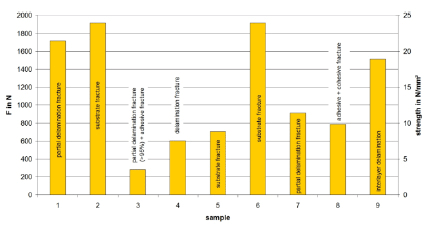 |
| Fig. 8: Critical failure force (left) and corresponding strength (right) of differently coated glasses (mirrors) from the optical industry |
|







